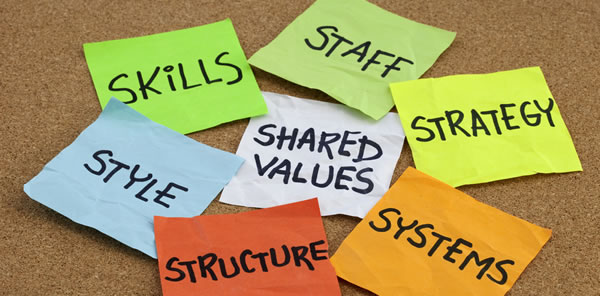Organizational culture becomes a micro-context in which a business can operate according to its own values within the broader spectrum of industry.
Organizational culture is what makes you business yours, what distinguishes it from others, and ultimately, what brings both your employees and your clients to your door every day. If organizational culture could be distilled, you might find it in the form of a mantra or motto.
However, organizational culture also embodies the other end of the spectrum, in that it is derived from a system of expectations, rooms, and morale-building and reward mechanisms. It is both systematic and abstract, and these aspects, rather than competing, build upon and complement each other.
Where does organizational culture come from?
What is it based on? Ultimately, the basis of your organizational culture will reflect your values as a leader and as a business or corporation. Not only will they reflect these values, but they will actively propagate and build upon them.
Organizational culture comes from the consideration of different aspects of the human experience as well as the experience of engaging in the marketplace from both corporate and individual perspective.
These considerations involve wide-ranging sources. They encompass everything from quantitative measures of effectiveness to qualitative indicators of emotional expression, as well as how the personal and quantitative aspects of both the business and interpersonal arenas interact.
Organizational culture considers both how the organization interacts with its components and its environment; it looks both in word and outward.
What does organizational culture require?
Organizational culture is composed of a few basic tenets, and these should be relatively consistent across companies even industries; the only difference is the particulars, which are specific to each organization and its vision.
Organizational culture requires a shared set of values, and the implementation of these values at all levels of the company. This means not only at every level in the hierarchy, but at every level in the process of assimilation into the company. In other words, these values should be evident from a potential hire’s first interview onward.
Expectations are another key feature of organizational culture, and obviously one that Perrys highly from one organization to another. These expectations can come in the form of expectations of hierarchy, deference, and authority, as well as in the form of differential valuations of urgency and outcome depending on the task, department, and context.
Organizational orientations
Each organization will have different orientations and degrees thereof, often dictated by the industry they are a part of. For example, certain fields required that administrations be more task-oriented than people-oriented, for the simple reason of efficiency.
Operating a brokerage is a unique intersection of these concerns, because it involves the people-oriented features of a small business as well as the task-oriented pressures of a fast-paced business and economic context.
One of the most interesting things that comes into play with organizational culture is the idea of context, and whether context is assumed or created. It is critical that team leaders be aware of the business context of their industry, and the constraints that this puts on their endeavors. However, it is also imperative that everyone involved take the responsibility of creating what context they can. Organizational culture becomes a micro-context in which a business can operate according to its own values within the broader spectrum of industry.




 Where do we send your free Great Agent demo?
Where do we send your free Great Agent demo?





 We just need some facts about your organization:
We just need some facts about your organization:
COMMENTS